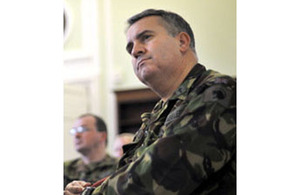Army chaplain brings comfort to the front line
Reverend Abeledo, aged 51, is spending six months working as Task Force Helmand senior chaplain, where all his skills as a minister will be …

Reverend Benjamin Abeledo, Royal Army Chaplains Department [Picture: Crown Copyright/MOD 2010]
Reverend Abeledo, aged 51, is spending six months working as Task Force Helmand senior chaplain, where all his skills as a minister will be tested to the full.
All military chaplains are required to complete a training course before they deploy. The course ahead of the current deployment was led by Rev Abeledo and provides the latest details of operations on the ground. It is also a chance for the ministers to get together to prepare mentally and spiritually for their role:
It’s mission-specific training,” explained Rev Abeledo, who knows better than most how crucial it is that the ministers are properly prepared for what they will face.
He was in Afghanistan in 2008 with 16 Air Assault Brigade as a chaplain for The Royal Highland Fusiliers, 2nd Battalion The Royal Regiment of Scotland but he says he expects to find things different again:
It’s becoming more problematic the way in which we are operating, the enemy, the weapons they are using - so in a sense going there as a chaplain highlights the importance of being able to do our ministry and do the best we can for the soldiers through the good, the bad and unfortunately sometimes the ugly.
The subjects covered in his briefing to ministers give some indication of how things have changed in the war-torn country. His brief includes instructions on how to deal with the dead, the wounded and the bereaved. There is also a frank ‘heads up’ as to what to expect from chaplains who have just returned.
Rev Abeledo’s first tour was in 2006, when he was Reverend to 3rd Battalion The Parachute Regiment. This was particularly difficult because it was the first time the ministers went to Helmand.
As Task Force Helmand senior chaplain this time, his role will take him to remote patrol bases where he will be living out the back of a Bergen.
Except for a weapon, he is expected to carry the kit the other soldiers carry. As well as Osprey body armour and a helmet, he carries communion kit, alter wine, wafers, prayer cards, bibles, new testaments, rosary beads, little crosses, ‘things to facilitate our ministry’ he said.
It falls to him to make sure he has what he needs to carry out his tasks, and experience has taught him it is not unusual to get stuck in one place for long periods:
The boys and the girls they’re more than happy to come and talk and very often they ask you for things and, if you have them, they’re eternally grateful to you because it is something that they can take with them, to be with them, wherever they go,” explained Rev Abeledo.
On operations, there is no church building and often the padre will share the cookhouse tent, serving prayers when the canteen takes its downtime. It is a solitary existence in the remote patrol bases but it is there, during the quiet times, that the crosses, the prayer cards and the Reverend’s words are often most needed.
As well as offering spiritual support to individuals and holding regular church services, the padre may be called upon to lead a repatriation ceremony, also known as a ‘ramp’ ceremony.
This special vigil service for those killed in action provides time for soldiers to remember a fallen comrade:
A repatriation service is the unit’s way of sending back one of their own,” said Rev Abeledo. “It is the only time, the last time, in which any of those soldiers will actually see their fallen.
They will not be there at the funeral service, it is one way of saying goodbye - a time to reflect, a time to mourn, and that has a wonderful sense of finality because once the door of that C17 closes down and the lights get shut down it’s actually like the committal.
It is ‘absolutely essential’ for the battlegroup he said:
We need it. The boys who basically have lost a friend, a comrade, they need to have a means where they can actually pause to reflect, to say thank you and to say prayers for the family and for themselves.
We cannot dwell on that too long because overly the work has to carry on.
Military chaplains have been described as the ‘rarest of the rare’. Throughout history they have been decorated for bravery in action - four have been awarded one of Britain’s highest awards for gallantry, the Victoria Cross, and some 400 have received the Military Cross.
They go out alongside soldiers unarmed. They face the heat, the dust and the dangers, relying on comradeship, faith and courage to keep them going, and it is that sense of community that gets them through the tough times.
Even in theatre, the ministers meet up for prayer and have gatherings. They are their own support network and they are crucially aware of the need to remain ‘spiritually fit’ in order to carry out their duty.
Often, it is not about the number of services they give or the number of soldiers they see but the few spoken words and the sharing of faith with others in the most difficult of circumstances.
Pared down, it is simply time shared together. And, as Rev Abeledo said, ‘sometimes it’s not the quantity of it, it’s the quality of it’ that makes the difference.
This article is taken from the British Army’s website.